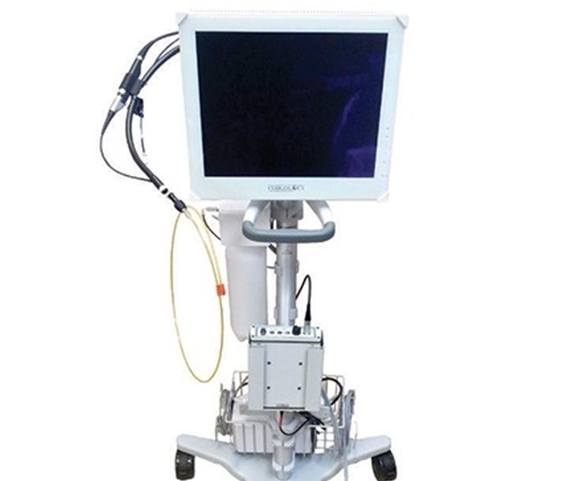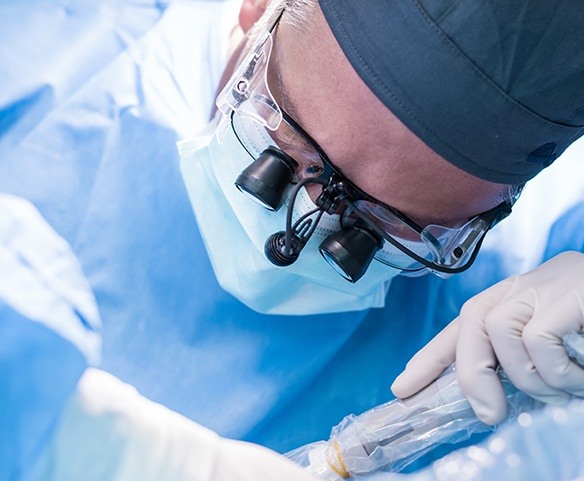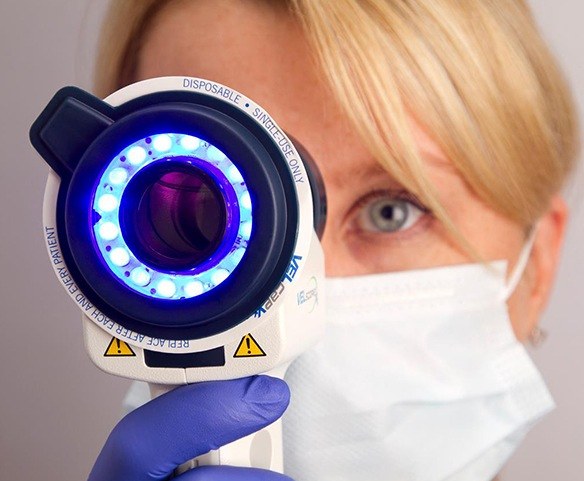
Periodontal Treatment – Lincoln, NE
Treating Gum Infections and Saving Your Teeth
Do you want your teeth to last the rest of your life? If so, you’ll need to keep your gums clean and free of infection. Otherwise you could develop periodontal disease (which is commonly known as gum disease). As a result, the gums will become red and swollen, and the support for your teeth will gradually be destroyed. To avoid a worst-case scenario, Drs. Rutledge, Le, and Bradley, can create a treatment plan for fighting the infection and giving the mouth a chance to heal itself. Call Pioneer Periodontics & Implant Dentistry today to schedule an appointment for periodontal treatment in Lincoln, NE.

Why Choose Pioneer Periodontics & Implant Dentistry for Periodontal Treatment?
- Conservative, Minimally Invasive Treatments
- State-of-the-Art Technology
- Ethical, Personable Staff and Doctors
Complete Periodontal Diagnostics
Since gum disease often develops silently, you might not realize how severe it is or how far it has already advanced. Before we can create a plan, we need to perform a proper diagnosis to figure out the extent of the infection and the damage that your mouth has already suffered. This process often involves checking for plaque and calculus (tartar) build-up and measuring the depth of pockets in your gums. (There are natural spaces between the tissues and the teeth but the deeper pockets form when the tissue starts to pull away from the teeth; deep pockets generally point to periodontitis, an advanced form of gum disease.)
Non-Surgical Periodontal Treatment

Following assessment of your oral cavity, a periodontal diagnosis will be given and treatment recommended based on the diagnosis. Treating gum disease does not have to be a complex undertaking. In fact, many times gingivitis can be stopped with a thorough cleaning, also known as a dental prophylaxis. We’ll check your teeth for plaque, tartar, and other debris that you may not have been able to remove with a standard brushing and flossing routine. Thanks to our periodontists’ attention to detail, we can catch this buildup before any further damage occurs. If periodontitis is diagnosed, initial treatment may include non-surgical scaling and root planing. Scaling & root planing are two procedures typically performed together focusing on cleaning not only the area above the gums but also the area below the gum line along the root surfaces of the teeth. Scaling allows removal of plaque and calculus (tartar) on the tooth structure. Root planing removes the layers of the root surface where bacteria have embedded to obtain a smooth tooth structure to minimize further bacterial penetration and reattachment. By reducing the etiological factors for periodontitis, stability of the periodontium can be attained.
Perioscopy Assisted Scaling & Root Planing

Non-surgical scaling and root planing is completed by tactile sensation with no direct visualization of the tooth structure. However, to give us a clear visualization of the root structure to ensure an accurate, thorough cleaning, a perioscope can be utilized during the procedures. The perioscope is a miniature camera which is inserted into the periodontal pocket throughout the scaling and root planing to give us a clear visualization of the root to ensure removal of plaque, calculus and/or any other etiological factors that might contribute to bacterial accumulation.
Minimally Invasive Periodontal Surgery
Even after the source of the gum infection is removed, the damage to the tissue will already be done. To help the mouth heal and regain its normal form and function, we can perform a minimally invasive surgical procedure to reshape the gums. Note that this is not a solution for gum disease; rather, the long-term goal of the treatment is to reverse any tissue loss that has occurred and give your teeth the best chance of survival.
Osseous Surgery

Leaving gum disease untreated for too long will result in the destruction of the supporting tissue and bone around the teeth, causing pockets to develop. To eliminate these pockets and preserve your natural smile, we might recommend osseous surgery to remove infected or diseased tissue from the area and reshape the bone. This creates a better environment for healing. Furthermore, you’ll have a much easier time brushing and flossing effectively when you don’t have deep pockets to worry about.
Oral Cancer Screening

As dangerous as gum disease is, it’s far from the only oral health issue that you need to worry about. Oral cancer usually manifests on the gums (and other soft tissues in your mouth) in the form of a discolored patch or an unusual lump. Drs. Rutledge, Le, and Bradley can check for abnormalities in your mouth that might indicate the presence of oral cancer. If an abnormality is detected, they can complete a biopsy to determine the definitive diagnosis for the abnormality. Identifying the disease early is usually crucial for giving you the best chance of survival.
Cosmetic Periodontics FAQs
What Can I Do About My Gummy Smile?
Some patients have what’s known as a “gummy smile,” which means that they have excess gum tissue covering up large parts of the visible surfaces of their teeth. Needless to say, this can cause self-esteem issues since it masks your beautiful pearly whites! What’s worse, though, is that it can increase your risk of certain oral health issues, meaning it’s a win-win to seek treatment. The go-to solution for addressing a gummy smile is a procedure called gum recontouring, or crown lengthening. It involves gently reshaping the gum line to expose more of the natural teeth as needed.
How Long Does Cosmetic Periodontics Last?
The results of cosmetic periodontics can last many years, especially with good oral hygiene and regular checkups and cleanings. Treatments like gun contouring or crown lengthening are often considered permanent while others, such as gum graphs, can last for several decades, depending on individual habits and health. Factors such as smoking, oral hygiene, and underlying conditions such as gum disease can affect the lifespan of your results. Our cosmetic periodontist will give you a personalized breakdown of how to help you maintain your results as long as possible.
Does Cosmetic Periodontics Hurt?
You might have concerns that undergoing cosmetic periodontics comes at the cost of having to endure painful procedures, but the truth is that cosmetic periodontists do everything they can to ensure these aesthetic treatments are as comfortable for patients as possible. For starters, most cosmetic dental work is minimally invasive to begin with, and if there is any sort of alteration being made to the gums or specific teeth, that area of the mouth will be adequately numbed. If you’re still feeling a bit nervous about undergoing any of these procedures, we are more than happy to add dental sedation into the mix. With options including nitrous oxide sedation, oral conscious sedation, and IV sedation, we can ensure a smooth and stress-free process, regardless of which treatment you’re receiving.
Is Cosmetic Periodontics Covered by Insurance?
Cosmetic periodontic procedures are typically not covered by dental insurance because they’re considered elective and not medically necessary. However, if a procedure has both cosmetic and functional benefits, such as treating gum recession or improving the ability for a restoration to be placed, partial coverage might be possible. That’s why it’s always worthwhile to familiarize yourself with the benefits of your policy. You can also pursue financing to help pay for your cosmetic periodontic services; our practice is proudly partnered with CareCredit, a trusted third-party financer that offers flexible, low-interest plans to qualifying patients. Just let our team know if you have any questions or need any assistance!